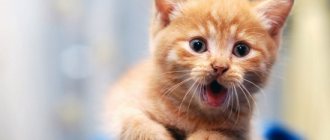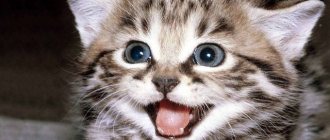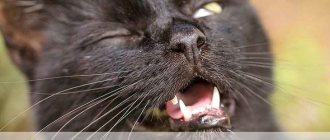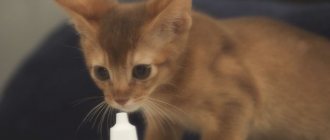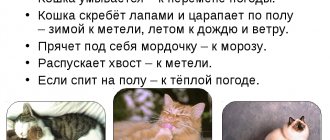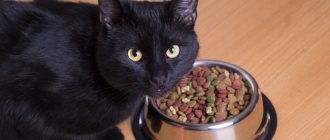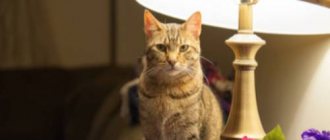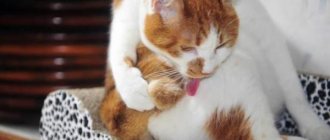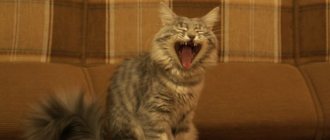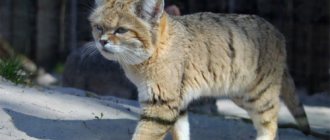Today, almost every person has pets.
The most graceful of them are cats and female cats. Taking care of your pets from a very early age, you may encounter some problems. When the baby is active, eats well, and has a healthy appearance, the owner should not worry. But not all owners know what to do if a small kitten does not eat well, looks exhausted and lethargic.
The dangers of not enough food for a kitten
An adult cat is able to survive for a long time without food or get by with a minimum of it. But for a small animal, nutritional deficiency can lead to serious problems. If a kitten does not eat anything or eats very little and poorly, this is fraught with:
- gastrointestinal diseases;
- anemia;
- pathologies of the liver and kidneys;
- breathing disorders;
- heart rhythm disturbances;
- developmental and growth retardation.
Of course, these complications occur when the animal eats poorly and eats little for quite a long time.
It happens that appetite disappears for just a few days, and then returns to normal. But if the kitten is thin and has not been eating well for a week or more, it’s time to sound the alarm.
© shutterstock
Dangerous symptoms
The presence of discharge from the nose of a fluffy indicates the development of a serious illness.
If a small kitten does not eat anything, constantly meows and does not play because it is in a different environment, there is nothing dangerous in such a situation. As soon as the baby gets used to it, sniffs and gets to know all the family members, he will calm down, and his appetite will certainly return soon. It’s another matter when the cub feels bad for unknown reasons. If any dangerous disease develops in the body, in addition to lack of appetite, other pathological symptoms will also bother you:
- increased body temperature;
- copious discharge from the nose and eyes;
- increased salivation;
- repeated vomiting;
- diarrhea or constipation, bloating, pain when pressing on the abdomen;
- refusal of water;
- blanching of the mucous membrane;
- presence of foreign matter in feces;
- lethargy, drowsiness, while the cat does not get up all day.
Possible diseases
In addition to completely harmless reasons, there are also those that are worth worrying about. We are talking about possible diseases of the pet. There are several options for what ailments can torment your furry friend:
- problems with teeth and oral cavity;
- indigestion;
- inflammation or wound.
Any healthy animal is easy to distinguish from a sick one. As a rule, cats suffering from the disease have decreased appetite, increased drowsiness and increased body temperature. There are also symptoms for which it is very important to consult a veterinarian.
Problems with teeth and oral cavity
Cats of any age are susceptible to this type of disease. Sometimes it is not so easy to determine what is tormenting your pet in the early stages of the disease. At first, the animal may simply refuse to eat, which the owner will explain as a slight change in mood, but if there is no appetite for a long time, you should pay attention to other symptoms.
Pets who have contracted an oral disease lose interest in food, because chewing food becomes painful or unpleasant. Usually such ailments are associated with plaque on the teeth. The cat's gums become inflamed, which causes him discomfort. Also one of the symptoms is bad breath and increased salivation.
Not only can a pet lose a fair amount of weight due to a long hunger strike, but it can also lose teeth if you do not consult a veterinarian in time. Therefore, it is better for the owner to more closely monitor the behavior of his beloved furry if he does not want to eat for a long time.
Digestive disorders
Cats often pick up various kinds of garbage they like from the floor, find food lying around in the most secluded corners of the home and taste it, and also swallow a lot of their own hair while licking themselves. It is not surprising that after such tastings, animals experience discomfort, heaviness and, possibly, even stomach pain, which is why they cannot eat normally.
Intestinal problems can be caused by insufficient water intake or stress. It won’t be difficult to spot problems in your cat’s health. He will vomit, possibly belching, diarrhea or constipation, flatulence and weakness. Eating in this state is out of the question.
Inflammations and wounds
The cat may experience discomfort both from internal inflammatory processes and from external damage. To find out if there is inflammation, you can measure body temperature, pulse and other indicators. If they differ from normal, and the cat does not eat and is not as active as always, you should immediately contact a veterinarian.
Causes of decreased appetite
There are quite a few factors that provoke a decrease in appetite in kittens. Some can be easily eliminated, while others are difficult to treat even in a clinical setting. Here are the main reasons:
- the animal eats poorly because the food does not suit it;
- decreased appetite is caused by changes in weather or living conditions (a kitten may not eat due to stress, just like a person);
- the owners overfeed the pet, and it protests, showing poor appetite;
- the baby doesn’t get enough attention or play and is sad, feeling bad “morally”;
- an infection has entered the body;
- there is any disease of the gastrointestinal tract, so the kitten refuses to eat;
- the animal eats little due to food poisoning.
If the kitten begins to eat poorly, you definitely need to figure out why. Often you cannot do this on your own. In this case, a veterinarian will help.
Why does the kitten refuse to eat?
Diseases
If a baby at the age of 2-3 months suddenly stops eating, becomes weak, lethargic, breathes heavily, and there is also an increase in temperature and nasal discharge, most likely an infection has entered the body, causing such symptoms. In such a situation, with proper treatment, appetite will normalize within two to three days. If this does not happen, the kitten weakens and gets worse; most likely, the disease is of a different nature. It will not be possible to find out the reasons for the deterioration on your own; the baby needs to be urgently taken to the veterinarian. Common diseases in which the kitten eats little or refuses food altogether:
- renal or hepatic pathologies;
- congenital cardiovascular disorders;
- gastric or intestinal dysfunction.
Stress is a common cause
At the age of 2-3 months, when the kitten happily eats complementary foods in addition to its mother’s milk, it can already be separated from the cat and given to new owners.
Finding himself in a new place without a mother, the baby will worry and meow, which does not contribute to the appearance of appetite.
In a new home, a baby left all alone experiences extreme stress. The cat refuses to eat and drink, walks around the house, meows, does not sleep, and hides from its owners. During this difficult period, it is important for a person to help the baby survive everything. It is recommended to communicate with the cat, encourage him to play together, give him something tasty, pick him up more often and show affection. Some kittens already feel more confident on the second day, their appetite, vigor, and good mood return.
Strong odor from food or dishes
When a 2-3 month old kitten begins to eat its usual food, the owner buys him a new, beautiful bowl. But you should focus not only on the appearance of the dishes, but also on what material it is made of and whether it has any foreign odors. Often new items smell like plastic in the first days of use, and the smell is so strong that the animal simply cannot stand it. Therefore, feeding a cat from such a bowl will be problematic. Some pets don't like the smell of the detergent the owner uses to wash dishes. In this case, it is better to abandon chemicals, wash the bowls in a soda solution and finally pour boiling water over them. Your pet may also not like the smell of dry or wet food, but this rarely happens. If the product is premium or super-premium, there should be no problems with foreign odors.
Too young
You can try to get rid of a very tiny fluffy using the mixture.
It’s rare, but it happens that a one-week or two-week-old kitten is left without a mother. It is very difficult to deliver a baby, because at this age, due to an insufficiently developed sucking reflex, it is difficult for him to drink milk from a bottle. A hungry cub constantly screams and quickly weakens. To prevent the baby from dying of hunger, the owner should make every effort. For feeding, it is recommended to buy a special bottle and formula for kittens. A weak baby will have to be helped to learn to suck; when he learns to do this, problems with feeding will disappear.
Parasite infestation
Kittens that were born to a mother with helminthiasis are most likely also infected. Babies do not want to eat because of the discomfort caused by worms breeding in the intestines. Soon the kitten becomes weak, its nose is constantly cold, its mucous membrane is pale. These symptoms indicate progression of anemia. With helminthiasis, the animal suffers from bloating, colic, diarrhea or, conversely, chronic constipation. External parasites can also cause a kitten to lack appetite. If traces of invasion are clearly visible on the body, it is better to contact a veterinarian who will prescribe a safe treatment regimen.
What to do if a small kitten cannot eat and drink on its own?
It happens that a little purr is separated from its mother cat too early. Experienced breeders of purebred animals give the kitten to new owners no earlier than 3 months of age, when it already knows how to eat on its own and is accustomed to a certain food. If the kitten was taken away from the cat when it was very tiny or the baby was simply found on the street, it is likely that he simply has not yet eaten anything other than his mother’s milk. The baby doesn't know how to lap from a bowl. Moreover, he has no habit of drinking water.
Such a cat will have to be fed milk from a pipette or bottle with a nipple. Moreover, it is recommended to use a special cat's milk substitute. Then you can gradually teach the kitten to lap from the bowl and eat wet food. A good way is to offer the baby food from your hand, sometimes this helps kittens start eating new food.
Feed the kitten by hand or syringe
Try hand feeding by placing a small amount of food on your finger and bringing it to your kitten's mouth. Try not to put your finger in his mouth as this may irritate him, but let him lick the food at his own pace and be patient. If finger feeding doesn't work, try a syringe. Gently holding the kitten, insert the syringe into the mouth at an angle. Do not insert it directly into his mouth as this will cause the food to go straight down his throat and could choke him. Fold the kitten to the right or left and squeeze a small amount of food onto the back of the tongue. Repeat the process several times until you feel your kitten has eaten enough.
Let's summarize: what to do if the kitten does not eat or drink
First of all, you need to carefully observe the animal. If there are no other alarming symptoms, you can try changing the food, bowl, and minimizing stressful situations.
But if the baby’s condition causes concern, and the owner cannot figure it out on his own, there is no need to waste time asking questions on various forums. You need to immediately take the animal to the veterinarian or invite a doctor home. An in-person examination and tests will help identify the exact cause of the ailment and prescribe treatment in a timely manner. If the fears are not confirmed, a professional doctor will give recommendations on proper nutrition. And just making sure your pet is healthy is never a bad idea.
Useful links:
Common Causes of Malnutrition
In most cases, malnutrition is associated with stress, age, or poor food quality. Sometimes kittens eat little due to health problems.
Bad feeling
Most often, a deterioration in appetite due to poor health is associated with factors such as:
- Vaccination period. After vaccinations, the body fights the introduced pathogen, which can lead to a lack of interest in food for 1-2 days.
- Infections. They can manifest themselves in the form of diarrhea, the presence of impurities in stool, cough, etc.
- Heat. In the summer, cats tend to eat less, as the body spends less energy on heating.
- Hormonal changes. Most often, a kitten begins to worry at 7-9 months during puberty.
- Diseases of internal organs. Dental pathologies, tumors, etc. can cause refusal to eat.
- Shedding. Long-haired cats and animals with thick fur coats are especially affected. Wool accumulates in the stomach and can cause vomiting or intestinal obstruction.
- Taking medications. Antibiotics often cause the condition to worsen.
- The period of estrus or sexual hunting. At this time, the reproductive instinct comes to the fore, so animals worry less about hunger.
- Intoxication. May be associated with the ingestion of chemicals into the body, internal diseases, poor-quality food, etc.
We suggest you read: How to wipe a cat’s eyes with increased lacrimation and acidification Sometimes cats are diagnosed with anorexia, but in most cases it is secondary and occurs as a consequence of another disease. Sometimes this condition can be observed in eating disorders.
In their natural environment, cats expend a lot of energy to catch small prey, so they always try to keep themselves full and eat a lot. Pets don't need to hunt, so they have poor portion control.
Cats are conservative and sensitive, so any changes or discomfort can cause the animal to refuse to eat. This happens due to stress. It can be provoked, for example, by moving. Changing family composition also affects the pet's well-being. Young kittens often do not eat well when they arrive at a new home. This phenomenon is temporary: the situation improves after 3-5 days.
The animal may not eat well if the room is not clean enough. Most often, this is observed in pets who are kept in enclosures and cages. They are unable to leave the area and contaminants accumulate, causing stress.
Little age
Month-old and younger kittens may have trouble eating due to constipation. In babies, the gastrointestinal tract is unstable, so they need massage to empty their bowels. Normally, the mother licks her kittens regularly to encourage muscle relaxation and the release of feces and urine. If for some reason the cat cannot take care of the cubs, the owner will have to monitor the digestion of the pets.
To get the kitten to go to the toilet, you need to wet a rough cloth with warm water and start stroking its belly. Then you should go down to the tail area. First, the animal will relieve a small need, then a large one.
Malnutrition may not be due to poor appetite, but to a lack of milk during the mother's lactation. In such cases, kittens continue to meow even after feeding. They gain weight by less than 5-7 g per day or lose weight altogether. If you weigh them before and after feeding, the difference will not be noticeable. To prevent malnutrition, you need to buy a special cat's milk substitute in the form of a mixture and supplement your pets with it.
If there is only one thin kitten, sleeps a lot and cannot get to the nipples because of its brothers and sisters, it needs help. You can supplement it with the mixture separately. An alternative option is to place it next to the most developed nipple. Other cubs need to be displaced at this time. If after this the kitten becomes active and begins to eat well, there is no reason to worry.
If an animal is separated from its mother early and sold to a buyer, food refusal may be caused by a lack of habit and insufficient development of the gastrointestinal tract. Kittens under 6 weeks of age are not ready to completely switch from milk to food.
Unpleasant odors
Bad odors from food, bowls, or poor indoor climate can trigger a deterioration in appetite. The latter is often associated with poor placement of trays. Cats prefer not to relieve themselves where they eat. Bad smell from the bowl in most cases occurs when feeding natural products.
When worn, the surface of the container is scratched, and food particles get into it, which become food for bacteria. The result is an odor. Another reason could be poor hygiene.
Often an unpleasant odor is caused by spoilage of food. Natural foods and wet foods can become unappealing to a kitten after just 30-40 minutes. Granules can remain fresh for a long time, but they are also susceptible to spoilage.
The average shelf life of dry food after opening the package is 6-8 weeks. Later, due to contact with air, it oxidizes, oils go rancid, and the smell and taste become repulsive. For this reason, it is not recommended to purchase food in bulk: bags can remain open in the store for a long time.
How many days without food is considered normal for cats?
Normally, fasting can last a different number of days depending on the reason:
- During the day, a cat can starve without harm to health in the hot season, while it consumes more water;
- also, no more than a day is considered normal fasting after moving;
- stress from changing ownership can also cause loss of appetite;
- meeting dogs on the street can become a stressful situation for a cat and also cause poor appetite;
- stress or manipulation performed by a veterinarian during a visit to the clinic can also affect the animal’s appetite;
- The cat may not eat for two days after anesthesia;
- during the release of hormones, the cat can eat on the third day;
- cats periodically refuse food and water altogether for several days during pregnancy.
For kittens
If a kitten under the age of six months is lethargic, does not play, sleeps a lot and has no appetite at all, then this is an alarming sign. The younger the animal, the faster all processes in its body proceed. For kittens under 6 weeks of age, going without food for even 12 to 24 hours can cause death. New owners often experience starvation of their pet when they take it home when it is two or three months old.
Reasons for fasting:
- too young and not ready for solid food;
- separation from mother;
- stress;
- change of home decor.
For cats and cats
If a young cat eats poorly for several days for no apparent reason and only drinks water, then most likely the animal is sick. He can cope with the infection, or there will be a remission of a chronic disease. Usually after this the owners stop worrying. But we need to fight not the symptoms, but the causes of the disease. To do this, it is imperative to contact a veterinarian, find out what exactly is happening to your pet and prescribe a course of treatment.
For a pregnant cat
While waiting for kittens, cats develop the following characteristics:
- Pregnant cats, like women, experience toxicosis. In the morning there is loss of appetite, nausea and vomiting.
- The pet becomes selective in food; she may be offered her favorite treats, but she refuses them. You need to buy specialized food for pregnant cats with a high content of micro- and macroelements.
- As the belly grows, pressure in the abdominal cavity increases and appetite decreases. From the 3rd week of pregnancy, the cat is fed 5-6 times a day in small portions. The food is wiped and soaked for absorption, and the amount of water is increased.
- When the cat refuses to eat at all, birth is expected soon.
- Refusal to eat in combination with fever, weakness and an unpleasant odor from the vagina of a pregnant cat is a reason to urgently consult a veterinarian.
For old cats
As cats age, their digestive organs wear out.
Typical diseases and problems appear:
- gastritis;
- enteritis;
- dysbacteriosis;
- diarrhea;
- constipation;
- change in stool color;
- vomiting, fasting;
- stomach ache;
- weight loss.
Prevention
To prevent the development of infectious diseases, pets must be vaccinated. Even if they live in an apartment and do not go outside, they have a risk of becoming infected.
The veterinarian conducts an examination and prescribes additional examination.
Living conditions play an important role in maintaining the health of a cat. Adequate, high-quality nutrition is a guarantee of high immunity. Pets should not be fed from the table or given human food.
To prevent the cat from getting bored, they constantly play with it and teach it different tricks. Such activities will tax her intellect and she will not get bored. If you need to move or create another stressful environment, you should first give the animal a mild sedative.
If a cat lives in an apartment, it is still treated for parasites with appropriate means every six months.
When you notice the first signs of thinness, it is better to contact a veterinarian. Only he will be able to correctly determine the cause of the condition and prescribe treatment.
The cat doesn't eat well, but is active: should I worry?
Cats sometimes get into a state where they don’t want to eat, because there is another, more interesting activity - playing, trying to seize the moment and sneak into the room where there is an aquarium or a cage with a parrot. Perhaps the body turns on a mechanism to get rid of excess weight.
Finally, there was a transition to a different, better quality diet. Less food contains more calories. The feed mixture included a feed intake limiter—dietary fiber.
The yield was reduced and its smell decreased because the digestibility of the feed increased. The owner compares the current food intake with the previous one and laments that the cat has begun to eat less. If the cat begins to eat less, but feels good and looks neat, there is nothing to worry about.
Be sure to read:
A cat sneezes: causes, symptoms, what to do, treatment methods, what should alert you
What should the owner do?
Every owner begins to worry when his beloved pet refuses his previously favorite treats. Bad thoughts begin to come into your head, and you want to somehow find out the reasons for this behavior of your furry friend.
In cases where there is no cause for concern, the owner simply must surround his pet with care. It is also important to be careful about what you feed your cat. Poor quality food will repel it, and the animal will go on a hunger strike.
If there is a sudden change in food and the cat immediately stops eating, it is recommended to try gradually introducing new food into its diet. It is possible that the problem lies in the dishes from which the pet eats. When the owner decides to please his mustachioed friend with a new bowl, he may not think about how convenient it will be to eat from it.
It is better not to traumatize the animal’s psyche by frequent changes of environment, at least the one in which it spends the most time. It is better to make the feeding area as comfortable as possible so that nothing blocks access to food.
When it comes to pet illnesses, it is recommended to immediately contact a veterinarian. You should not self-medicate. This may seem harmless, but it can actually cause dire consequences. Without the help of a veterinarian, it will not be possible to give your pet the correct diagnosis, because he himself is not able to specifically indicate the sources of pain.
Felines are very unpredictable; one minute they can actively sit in front of their owner and beg for a piece of treat from the table, and the next they arrogantly turn away without even sniffing it. You don't have to start panicking immediately after this. Perhaps the cat simply lost his appetite. But if this behavior continues for a long time, the cat owner should be wary. Animals can't talk, so they won't tell you what's bothering them.
The article is for informational purposes only. Contact your veterinarian!
When a cat refuses to eat for a long time, but regularly drinks water and does not have accompanying symptoms of diseases, the owner should:
- Stop giving the animal increased attention, provide the cat with a quiet place with comfortable bedding, where he will not be disturbed by other household members. If a cat is trying to hide, do not disturb the animal.
- Try changing your pet's menu.
Be sure to read: We suggest you read: Is it possible to feed a cat baby food?
Dry nose in a cat: reasons, what should be normal, good or bad, what to do
If alarming symptoms have been added to the refusal to eat, or behavior has changed, it is necessary to undergo an examination at a veterinary clinic.
The veterinarian will examine the oral cavity, measure body temperature, palpate the abdomen, weigh the animal, and prescribe tests. Having identified the picture of the disease, he will recommend adequate treatment. You need to follow the recommendations and give your cat medications on time.
Complete refusal to eat
Complete refusal to eat, reluctance to drink water, constant lethargy of a pet is a serious reason to consult a doctor. But sometimes such symptoms accompany severe stress.
In this case, the cat should not be disturbed for a couple of days; perhaps the animal just needs to be in peace and quiet. If the cat's condition does not change after some time, the visit to the clinic cannot be postponed, otherwise the animal may die.
Algorithm of the owner’s actions in case of complete refusal of food:
- Provide your pet with a comfortable, quiet resting place away from drafts.
- Place a bowl of clean water next to the bed.
- Organize regular ventilation of the room.
- Protect the cat from contact with household members and other pets.
- Monitor the condition carefully, and if the condition worsens, take it to a veterinarian.
How and how to help an animal
If a cat refuses food and water, then the first thing to do is take your pet to a veterinarian. It is not possible to make a diagnosis on your own at home, so you need to call a doctor at home or take your pet to the clinic.
If it is impossible to get to the veterinarian in the next 24 hours, then you need to provide the cat with rest. To do this, you should prepare a clean litter; it should not be too soft or too hard. If an animal is hiding, you should not force it out of its hiding place. You can only place a bowl of food and fresh water nearby.
Bowls of water and food should always be available to the animal.
Under no circumstances should you try to give your pet any medications without first consulting a doctor. Otherwise, you can only cause harm and provoke life-threatening consequences.
If the doctor has determined the cause, then you should follow the specialist’s recommendations and give medications according to instructions in the required dosages. This must be done calmly; you must not cause pain to the animal. Before giving medication, the cat needs to be stroked, and the tone of voice should be calm. This way, the pet will tolerate the treatment better, will not resist too much and will recover faster.
Additional recommendations:
- If the cause is stress, then the cat should be left alone for a while. It is advisable to call her to eat in a gentle tone. A calm and quiet environment, the absence of extraneous noise and periodic stroking will help you recover from stress.
- If your pet doesn't like the food, you need to replace it as soon as possible. It is recommended to give preference to balanced foods rather than cheap options containing a lot of harmful additives.
- In case of gastrointestinal upset and poisoning, you can give the animal activated charcoal (500 mg per 1 kg of weight). In this case, the tablet must be crushed and dissolved in 1 tsp. water. It is most convenient to give medicine using a syringe without a needle. It is enough to do this procedure once before seeing a doctor.
- Ticks and fleas are eliminated using special antiparasitic medications. You should not use them on your own; you should first consult your doctor. However, if this is not possible in the near future, and the animal has fleas or a tick is found, you can purchase Bars or Celandine shampoo.
- If the cause is helminthic infestations, then treatment is carried out with the help of anthelmintic drugs. The medication should be given only according to the regimen recommended by the doctor. Otherwise, larvae may remain, which will provoke a relapse.
- To alleviate the condition of an animal with gum inflammation, you can use a solution of Miramistin or potassium permanganate. It is necessary to treat the gums using a cotton pad and the selected product. This needs to be done 2 times a day. Do not press on problem areas.
A weak solution of potassium permanganate can be used to treat inflamed gums
What to do if your pet doesn’t eat, doesn’t drink and constantly sleeps
If an animal does not eat or drink, and also sleeps constantly, then this is an alarming signal of serious health problems. However, in extremely rare cases this is associated with stress. In this case, the pet should be left alone and allowed to rest. There is no danger in inactivity after stress. If the animal is lethargic, does not eat or drink for another reason, then postponing a visit to the doctor is dangerous, since with a serious pathology the cat may die.
Some recommendations that will help you hold out until the doctor arrives:
- It is necessary to ensure that fresh air enters the room.
- Do not disturb the pet. If there are other animals in the house, then for safety reasons it is better to isolate them from contact with the sick cat.
- Make sure the water in the bowl is always clean.
- If there is a special medicinal herb for cats in the house, which breeders often grow in pots, then you can pick a little and put it next to your pet. If desired, the animal can be treated with such a safe remedy.
Attention! If a cat does not drink for more than 24 hours, it can cause death. In this case, water must be injected forcibly using a thin syringe without a needle, gradually pouring it into the mouth.
How to help a kitten
If the kitten does not eat anything or drink water, then first of all you need to pay attention to the nature of the food. Small pets need special soft food. It is impossible to give a kitten food intended for adult animals, since the gastrointestinal tract of babies is still very weak. Long-term refusal of water is dangerous, so you can give your pet water using a pipette. Every hour you need to give water forcibly. The liquid should be administered in small quantities - one pipette at a time is enough.
Giving your kitten water using a pipette will prevent dehydration
In addition, the kitten should be carefully examined for rashes, sores and fleas. Particular attention should be paid to the withers and ears. If everything is clean, then most likely the problem lies in the functioning of the internal organs, which can only be determined in a clinical setting.
Attention! If a kitten has a sore in the withers area, under no circumstances should you burn it with iodine or brilliant green. This may indicate the presence of a mite or lichen. In this case, you need to undergo the necessary tests and isolate children and other animals from contact with the kitten until complete recovery.
